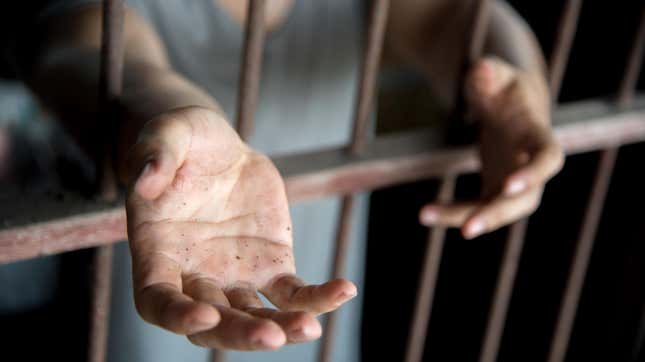Alabama Jailed Pregnant Woman for Months, Made Her Sleep on Floor Over Alleged Marijuana Use
Ashley Banks' case is the tip of the iceberg. Pregnant and postpartum people are being jailed and mistreated in Alabama and across the country.
AbortionPolitics

At about six weeks pregnant in May, Ashley Banks was arrested and jailed over an unregistered gun and possession of a small amount of marijuana. These charges typically allow for individuals to post bond and leave jail until their trial. But in Banks’ case, when police learned she’d smoked weed two days earlier—the same day the 23-year-old learned she was pregnant—she was forced to remain in the Etowah County Detention Center in Alabama unless she entered drug rehab, per a new report by Alabama-based outlet AL.com.
There was just one problem: Rehab centers wouldn’t take her. State specialists who evaluated Banks for drug addiction repeatedly found she didn’t qualify for free addiction services offered through the state. Banks’ lawyers say state investigators pressured her to “admit” to a drug addiction she didn’t have so that she could access rehab, pay the $10,000 cash bond for allegedly exposing her fetus to drugs, and leave jail. Banks refused.
As a result, she was forced to remain behind bars for months. Banks has a high-risk pregnancy because of her family’s history of miscarriage and was diagnosed with subchorionic hematoma, meaning blood pools near the wall of the uterus, increasing the chance of miscarriage, pre-term delivery, and other complications. But because the lower-bunk of Banks’ jail cell was double-booked, she was forced to sleep on the floor for weeks. Over a month into her time in jail, Banks began bleeding and continued to bleed for five weeks; she told AL.com she struggled with hunger and fainting spells as well.
This—all because she’d smoked weed the day she learned she was pregnant and refused to falsely testify that she had a drug addiction.
-

-

-

-

-

-

-

-

-

-

-

-

-

-

-

-

-

-

-

-

-

-

-

-

-

-

-

-

-

-

-

-

-

-

-

-

-

-

-

-







































